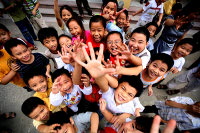 The United Nations Educational, Scientific and Cultural Organization (UNESCO) is an international organization founded in 1945 to contribute to peace and security by promoting international collaboration through education, science, and culture.
The United Nations Educational, Scientific and Cultural Organization (UNESCO) is an international organization founded in 1945 to contribute to peace and security by promoting international collaboration through education, science, and culture.
In an unilateral action, the United States of America has decided to stop contributing funds to UNESCO as a reprisal for accepting Palestine as a member state:
Victoria Nuland, a State Department spokeswoman, said that American contributions to Unesco, including $60 million scheduled for this month, would not be paid.
UNESCO has declared that:
It is well-known that funding from our largest contributor, the United States, may be jeopardized. I believe it is the responsibility of all of us to make sure that UNESCO does not suffer unduly as a result.
In a world with 7,000,000,000 people, UNESCO develops key programmes to promote literacy, education, science, and technology. Eventually, I believe the USA will start contributing again to UNESCO, but in the mean time I think we have to collaborate, not only with words but also with funds so that the work of this organization can continue. Please, it will take just a minute of your time to make a donation today »»